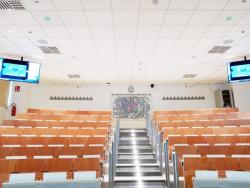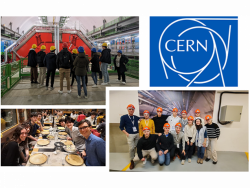- Home
- Dipartimento
- Ricerca
- Didattica
- Post Lauream
- Trasferimento della conoscenza
- Come fare per
Foreign students
What follows is something that may help a little bit the Erasmus Students coming to Trieste, in constructing their Learning Agreement.
If you have trouble, please do contact the Erasmus physics representative Angelo Bassi at bassi@ts.infn.it and he will be more than happy to help you.
Academic Titles
The University of Trieste offers, according to the Sorbonne and Bologna project set forward from the European ministries of educations, two titles: Degree in Physics and Master Degree in Physics.
Degree in Physics "Laurea in Fisica"
A 3 year bachelor (called "Laurea") which requires 180 ECTS.
The academic year is divided in two terms, with a 1.5 months interval between terms dedicated to individual study and exams.
Courses of the three-year bachelor (LAUREA) degree:
I Year _ Mathematical Analysis I (9 ECTS), Mathematical Analysis II (12) , Geometry (9) , Computing Laboratory (6) , Newtonian Physics (10) , Thermodynamics and Fluidodynamics (6) , Foreign Language course (3) , Laboratory I (8)
II Year _ Mathematical Methods in Physics (9), Introduction to Quantum Physics (8) , Electromagnetism (9) , Electrodynamics, Optics and Relativity (12), Laboratory II (8), Laboratory III (7) , Chemistry (6)
III Year _ Quantum mechanics (9), Introduction to Condensed Matter (8) , Statistical Physics (6), Introduction to Nuclei and Particles (8), 2 Optional Courses (2x6), Professional Course (6), Apprenticeship (3) , Thesis (6)
The Thesis consists of a brief project done under the supervision of a professor of the University of Trieste on a topic of interest either for the research community or the industrial world.
Master Degree in Physics "Laurea Magistrale Interateneo in Fisica"
After the bachelor degree, students can continue for a 2 year Master Degree in Physics ("Laurea Magistrale"), held in collaboration with the University of Udine. The "Laurea Magistrale" degree can be compared to an advanced master in physics or in astrophysics in the Anglo-Saxon system or to the last two years of the New European Educational System as fixed by the Bologna-Sorbonne agreement among the European Ministers of Education in the mid nineties. The "Laurea Magistrale", besides a set of courses with their relative exams, requires the preparation of a research thesis for a total of 120 ECTS points. For the thesis the students can profit from the interaction and supervision of the many scientists working in the Trieste Area at various research facilities like the University of Trieste (http://www.units.it/), the laboratories of INFN (http://www.ts.infn.it/), the ICTP (http://www.ictp.it/), the Elettra Synchrotron Machine (http://www.elettra.trieste.it), the INAF-Astronomical Observatory of Trieste (http://www.ts.astro.it/), INFM (http://www-dft.ts.infn.it/INFM/), OGS (http://www.ogs.trieste.it/) and SISSA (http://www.sissa.it/).
The courses are normally given in Italian; they are given in English when students of specific international programs (non Erasmus) are present.
The general rules for the admission are specified in https://www2.units.it/stranieri/en. The applicants must reach a minimum level of understanding of basic physics; they must have passed exams in calculus, geometry and informatics for at least 15 credits (15 ECTS), classical physics (dynamics, thermodynamics, electromagnetism, acoustics, optics), quantum mechanics, relativity, statistical physics, condensed matter physics, nuclear and subnuclear physics, physics laboratory ( experimental practice and statistical analysis of the experimemental data) for at least 30 credits (30 ECTS) .
This level is verified by a Commission for the admission to the master degree in physics. The members of committee are listed in http://df.units.it/it/didattica/corsi-studio/Organi-della-didattica. The committee evaluates the curriculum vitae, the transcript of records and the syllabus (i.e. the lists of topics covered in each course) of the applicant, and may interview the applicant.
Master degree in Physics consists of six curricula:
- Condensed Matter Physics
- Nuclear and Sub-Nuclear Physics
- Theoretical physics
- Environmental and Interdisciplinary Physics
- Astrophysics and Cosmology
- Quantum Science and Technology
Each training track is characterized by some compulsory courses. Other courses are optional and are left to the choice of the student, within some limitations.
The I semester of the II year includes two courses plus an 'Apprenticeship' and part of the Thesis work. The 'Apprenticeship' include some reading and/or laboratory work which the student privately agrees upon with his thesis advisor in order to better tackle the thesis topic. The II semester of the II year is totally devoted to the thesis work.
Some Exams consist of an oral and written part.
The Teaching of the various courses is done at the: DIPARTIMENTO DI FISICA, VIA VALERIO 2, TRIESTE 34127
JOINT MASTER'S DEGREE IN PHYSICS academic year 2023/2024
Joint Master's degree in Physics
Ultimo aggiornamento: 02-02-2024 - 11:38
INFORMAZIONI: DIDATTICA
- Corso di Laurea Triennale
- Corso di Laurea Magistrale Interateneo
- Orari delle lezioni
- Calendario prove scritte
- Orientamento: Informazioni per giovani, studenti e scuole






